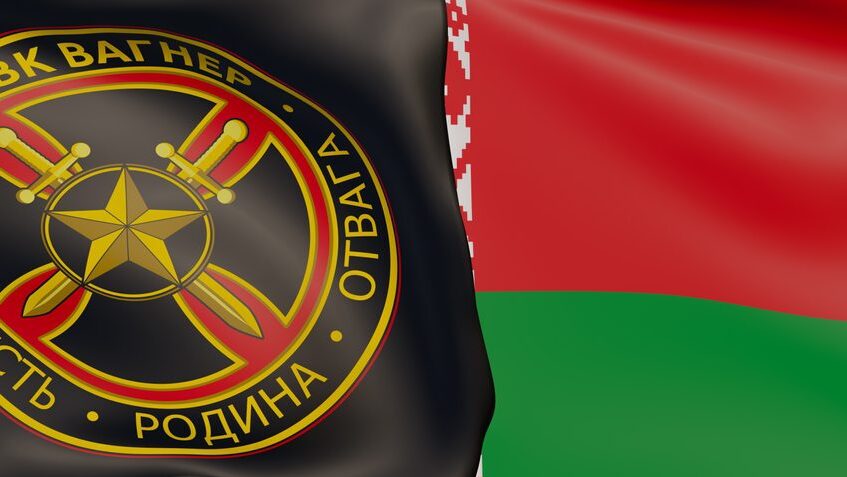
Photo: Fly Of Swallow Studio / Shutterstock.com
Poland is moving troops to its eastern border over Wagner’s presence in Belarus.
One month after part of the Yevgeny Prigozhin-led private military group mutinied against Russia’s military leadership, its forces are trickling into close ally Belarus, with the latest reports saying over two thousand are currently in the country.
For the first time since his failed march on Moscow, the Wagner boss has reappeared in a new video.
In the blurry footage, the 62-year-old Prigozhin welcomed his troops to Belarus. He told them that they will no longer fight in Ukraine itself, but that the organisation’s focus would now be to “help train the Belarusian army,” which he was certain it could turn into “the second best army in the world,” after Wagner itself.
The mercenaries’ arrival in Belarus is part of a deal made between Belarusian President Lukashenko and Prigozhin, which offered the otherwise popular figure—feted for his military successes in Ukraine—a way out after his Russian misadventure. In exchange for security guarantees from the Kremlin, the leader finally accepted his exile in Belarus.
Belarus would eventually become a launching pad for new operations by Wagner—denied heavy arms and transport aircraft by the Russian Defense Ministry for now—in Africa, where it offers military services to governments.
Currently, Wagner soldiers are mainly embedded in Mali and the Central African Republic (CAR). While the Kremlin is set on continuing Wagner’s activities on the continent, Prigozhin’s role—for obvious reasons—is likely to see a significant downgrade.
News of joint exercises between the Belarusian army and the Wagner Group proved a sufficient enough “provocation” for the Polish Security Committee—chaired by Defense Minister Mariusz Blaszczak—to move a battalion of at least 1,000 Polish soldiers to the Belarusian border.
While that decision had already been made on Wednesday, July 19th, it was only made public on Friday morning.
The committee had “analysed possible threats, such as, for instance, the deployment of Wagner Group units.” Based on that analysis, the Polish defence minister had decided “to move our military formations from the west to the east of Poland,” the secretary of the committee told the Polish state news agency PAP.
According to Belarusian state news agency Belta, the first such joint exercise is already in full swing outside the city of Brest and is to last a week.
As reported by Reuters, residents living near the Poland-Belarus borders have stated that they could already hear shooting and helicopters, which only served to fuel their fears that the Russo-Ukrainian war might eventually come to them.
During his visit to the Czech Republic, German Defense Minister Boris Pistorius said on Friday that, as a NATO ally, Germany “will be ready” to help defend Poland’s eastern border in case of aggression.
During a Security Council meeting that same day, Russian President Vladimir Putin accused Poland of nurturing “territorial ambitions” in the former Soviet Union, where they sought to “‘regain,’ as they see it, their historical territories, that is, modern-day Western Ukraine.” It was also “common knowledge,” he added, that they “dream about Belarusian land.”
In a warning to Warsaw, he said that “any aggression against [Russia’s] Belarusian allies will be considered an attack on Russia itself” and would be “answered with all means at our disposal.”
As is his wont, in his remarks, Putin took recourse to history to bolster his argumentation by mentioning Poland’s alleged participation in the partition of Czechoslovakia following the Munich Agreement with Adolf Hitler in 1938, after which it occupied Cieszyn Silesia.
Poland’s “aggressive policy,” he continued, then led to Poland’s Western allies throwing it “to the German wolf, the German military machine.” As a result, Poland “lost its independence and statehood, which were only restored thanks in a large measure to the Soviet Union, and that it was ”thanks to [Russian leader Joseph] Stalin’s position that Poland acquired substantial territory in the west, German territory. It is a fact that Poland’s western lands are a gift from Stalin.”
“Have our Warsaw friends forgotten this? We will remind them,” he concluded.
Predictably, Putin’s narrative, which the EU first identified in 2020 and termed part of Moscow’s disinformation campaign, found no receptive audience in his Polish counterpart, Prime Minister Mateusz Morawiecki.
In a Friday tweet, Morawiecki said that “Stalin was a war criminal, guilty of the death of hundreds of thousands of Poles,” and that “historical truth is not debatable.”
“The ambassador of the Russian Federation will be summoned to the Ministry of Foreign Affairs,” he concluded.
Stalin był zbrodniarzem wojennym, winnym śmierci setek tysięcy Polaków. Prawda historyczna nie podlega dyskusji. Ambasador Federacji Rosyjskiej zostanie wezwany do MSZ.
— Mateusz Morawiecki (@MorawieckiM) July 21, 2023
On Sunday, Putin is slated to hold a meeting with his Belarusian counterpart, with whom he will continue discussing “the further development” of their strategic partnership.
